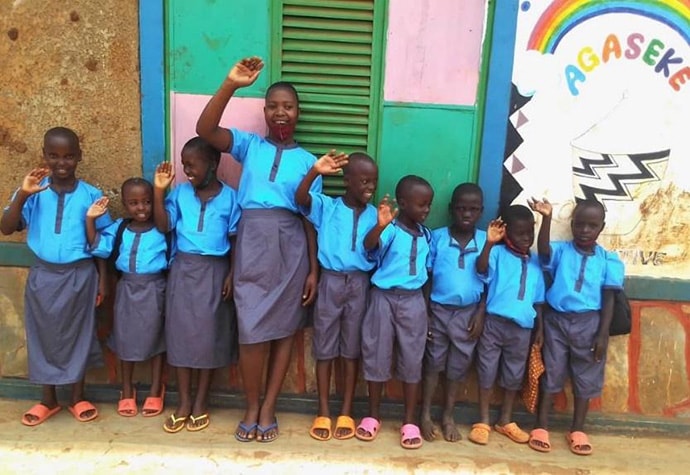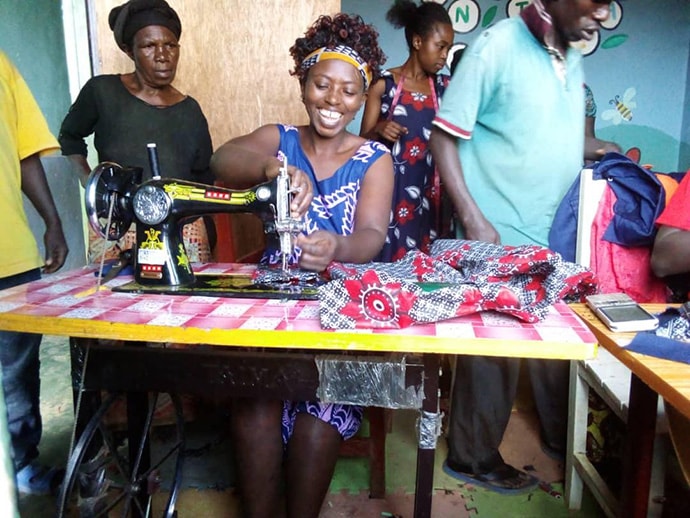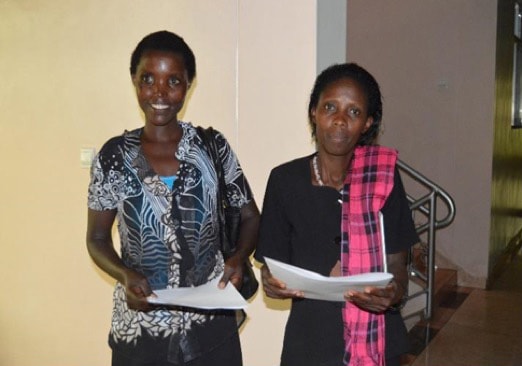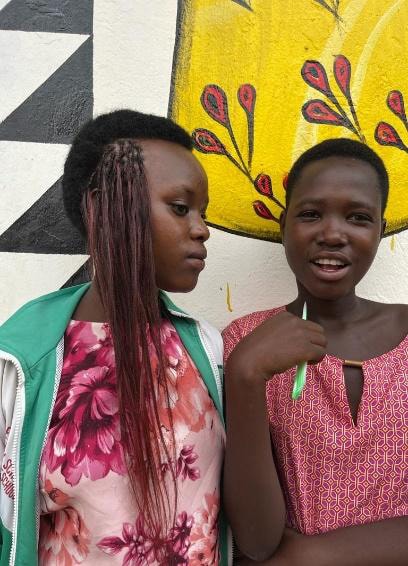By Dr. Karl Weyrauch, Founder and Medical Director, Pygmy Survival Alliance

Irerero Nursery School prepares students for success in Primary School and in larger Rwandan society. Photo: Claude Bizimana, PSA Field Manager
Traditionally, there was no use for reading among the Batwa, the indigenous people of Rwanda, also known as “Pygmies” and “Historically Marginalized People.” In the forest, which was their home for millennia, there was nothing to read: no books, no paper, no electronics. Also, no formal schools or written tests. The elders never learned to read, and many thought reading was useless for feeding hungry mouths.
When the city grew closer and roads came to the forest, things changed. It was the roads that began to cause problems. Without following it all the way to its end, no one had a clue where the roads went. That was a very long walk, and although adults could do that, it was too far for the children to go. They would go off into the forest, come across a road and then get lost. One day, someone noticed flat surfaces with markings on them posted by the roadside…road signs. It turned out that if one understood road signs, it was easier to not get lost. We are told that that was the first time Batwa people realized that teaching their kids to read might be a good thing.
However, learning how to read meant going to school, and that was not simple. Schools were far away. It took a lot of energy to walk there. Since there was no food except at midday, when a fire could be made and water boiled for cooking, going to school meant there was nothing for students to eat but a few beans at the end of the day. There were other barriers too. For example, most children had no shoes and without shoes they were not admitted into class. Also, they had no clothes, yet students needed school uniforms. Plus, there were fees for tuition, paper and pencils and there was no money for any of that, so for a long time, most of the children in the village of Bwiza could never go to school.
In 2015, Pygmy Survival Alliance was asked to help the Batwa people create a new future by helping all their children attend school. We never dreamed that doing so would raise the status of women in society. But it did. Batwa women in Rwanda have long been regarded by other Rwandans as social outcasts. They are routinely considered non-human. There is even a commonly used insult in the Kinyarwanda language that translates as, “you look like a Batwa woman.” Yet, when Batwa women get the chance to learn and develop, they catapult their status in the eyes of society beyond what most people ever thought possible.
The trick is that it doesn’t always take a classroom for this kind of educational advancement to occur. Yes, classrooms do work best in early childhood—ages five and under. Pygmy Survival Alliance operates an amazingly successful early childhood education school for Batwa people—the Irerero Nursery School—that now serves 171 students in four classrooms and feeds over 200 children with eggs and porridge to combat protein malnutrition. That school is producing fantastic results by establishing healthy learning patterns and brain growth during early years of development. The graduates have a head start on their peers in learning language and math. They have a beginning comprehension of English and most importantly, they know how to present themselves to others and so earn the respect of people not from their village. They have become the top students in the local Primary school, something that has never been possible there before for any Batwa children. And many of them are girls who thus have already succeeded at outgrowing the stigma of being born female in a historically marginalized community.
But what about the girls who have already dropped out of further education because of the incredible challenges they confront? Is there any hope for them? These young women continue to face significant discrimination. They are victimized sexually because of their status, and because of persistent cultural myths that promote sexual predation, such as, that if a man has sex with a Batwa woman, his back pain will be cured. They often conceive pregnancies and must face motherhood without a partner before age fifteen. Classroom education becomes even more distant under such circumstances. It is not unusual for women to find themselves in their twenties with five or more children to support mostly by themselves, especially in cases where their parents are incapacitated or absent because of illness or bad luck.

Vocational training in sewing provides a rewarding skill that is widely useful in Rwanda and builds a woman’s self-esteem. Photo: Claude Bizimana, PSA Field Manager
Luckily, there are at least four alternate educational pathways that can be more applicable and successful for women who have no literacy background and are isolated from typical educational institutions. These alternatives reinforce the fact that learning continues outside the classroom and through other means. Important lessons learned in this way can help women protect their own bodies, raise their social status, and improve the welfare of their families.
Adult literacy classes have been one of the easiest ways to support educational development in the villages where we work. Since electricity came to the village of Cyaruzinge, Pygmy Survival Alliance has supported teachers to provide basic literacy and numeracy training for adults three nights a week. Men and women work together in this setting to support each other and learn at their own pace. The fact that all genders are welcome builds mutual respect and gives explicit acknowledgement that educational advancement is for all.
SHARE (sexual health and reproductive education) classes have been especially well received by young adults who are exploring their own sexuality and looking for answers to personal questions. By having trained sex education teachers, including nurses, discuss basic human anatomy and sexuality creates a constructive atmosphere of professionalism. This approach helps lead to parental and administrative acceptance of what otherwise might be seen as controversial subject material. At the graduation ceremony from this program, students provide a theatrical performance demonstrating to others the benefits of contraception use, safe sex, and measures to prevent gender-based violence. They report feeling more empowered to move ahead in life and avoid victimization.
Training classes for the creation of production Cooperatives have been vital for the rise of gender equity for women in the villages where we work. Such skills as business management, record keeping, and leadership practice are key for organizational success and are a significant boost for women entrepreneurs. Agricultural, basket making and performing arts Cooperatives have given participants practical skills enhancing financial success and the social status of women. Without such social structures for capacity building from the ground up, villages of former hunter-gatherers do not evolve as rapidly from life in the forest to life in a more complexly developed village, in our experience.

After putting into practice the business skills they learned, two Batwa women receive entrepreneurship awards for their success. Photo: Claude Bizimana, PSA Field Manager
Finally, Vocational Training has been a fundamental pathway for the enhancement of gender equity. Women, and some men too, have followed programs for teaching sewing skills and hairdressing supported by Pygmy Survival Alliance. Learning to operate a treadle sewing machine takes focus, practice, and perseverance and leads to steady employment. Also, hair styling has proven to be a popular way for Batwa adolescents to express their own personality while delivering a service that is both popular and profitable. Now, a village hair salon employs local hair stylists who are teaching their trade to younger women in the village.

Young hair stylists are leading the way with innovative looks that enhance the status of women from historically marginalized communities in Rwanda. Photo: Claude Bizimana, PSA Field Manager
When Pygmy Survival Alliance started, we knew that education would be important just on principle. Now after fifteen years of practice in Rwanda, we know that education in many different forms is more than important: it is vital to the empowerment of a community and the achievement of gender equity. When we started, we knew that preventing infant deaths would be good for children. We could not foresee just how good it would be for fathers and mothers, too. Preventing infant deaths led to the beginning of reading. And to our great surprise and delight, it has led to raising the status of women in society, with no end in sight.